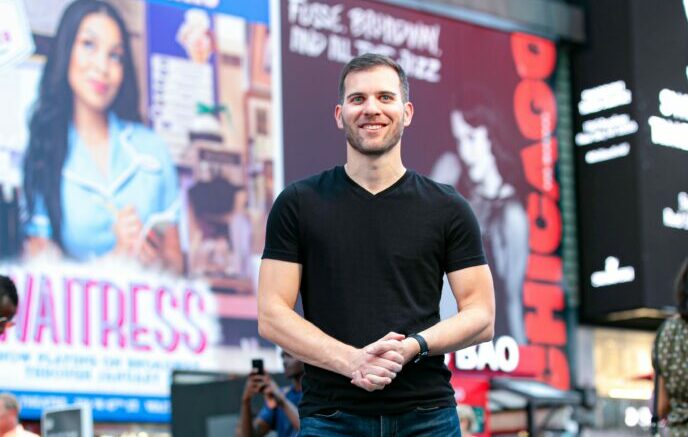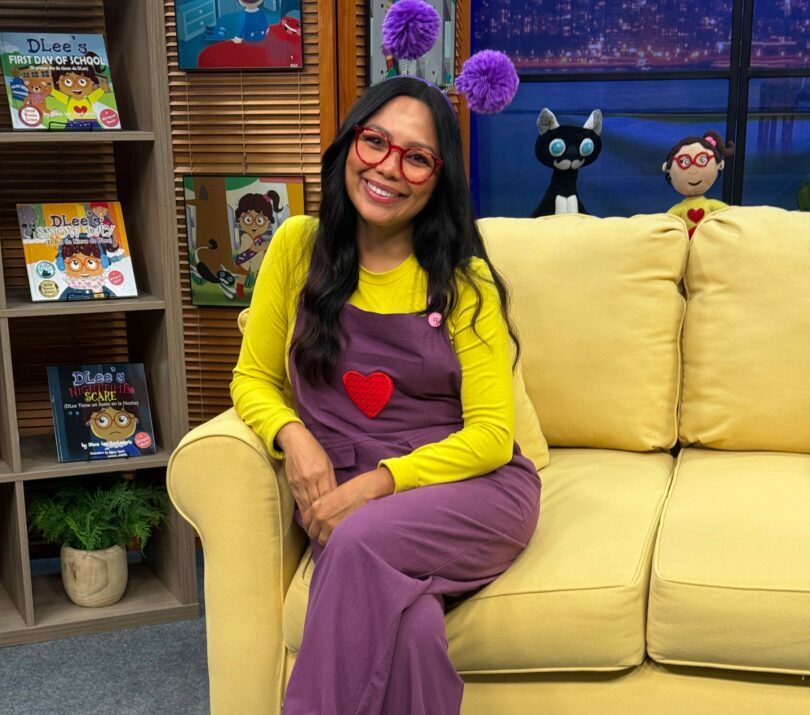We caught up with the brilliant and insightful Kyle Denman a few weeks ago and have shared our conversation below.
Hi Kyle, thank you so much for opening up with us about some important, but sometimes personal topics. One that really matters to us is overcoming Imposter Syndrome because we’ve seen how so many people are held back in life because of this and so we’d really appreciate hearing about how you overcame Imposter Syndrome.
Imposter syndrome is something I’ve definitely dealt with at different points in my career. Early on, especially when I was making the transition from political science to fashion, I often felt like I didn’t belong in the industry. I’d see other designers with formal education or more experience, and I’d question if I was ‘good enough’ to succeed or if I deserved the recognition I was receiving. It’s easy to fall into that trap of feeling like you’re just ‘faking it’—especially when you’re still learning and growing.
What helped me overcome it was reminding myself of the bigger picture. I realized that imposter syndrome often comes from a fear of failure or comparison to others. But success, I’ve learned, isn’t about being perfect or having all the answers—it’s about growth, learning, and the willingness to take risks. I began focusing on my own journey rather than comparing it to others. Each milestone, whether big or small, was proof that I was on the right path.
Additionally, I surrounded myself with people who believed in me, like mentors and collaborators, who encouraged me to keep pushing forward. Their confidence in my abilities helped me build my own. I also made a conscious decision to embrace my unique perspective—coming from a political science background—and use that to fuel my creativity, rather than seeing it as something that might make me an outsider in fashion.
Ultimately, overcoming imposter syndrome is an ongoing process. It’s about acknowledging those feelings, but not letting them control your actions. I’ve learned to trust in my own efforts and value my unique perspective and voice. Now, whenever that feeling creeps in, I remind myself that effort beats talent every time—and my hard work and passion are what truly define me, not anyone else’s standards.

Great, so let’s take a few minutes and cover your story. What should folks know about you and what you do?
I am a fashion designer, but my work extends far beyond simply creating clothing. I see fashion as an art form, a tool for social change, and a powerful means of storytelling. My focus is on crafting collections that are not just beautiful, but meaningful—pieces that challenge perceptions, reflect diverse experiences, and empower individuals to express their authentic selves.
One of the things that excites me most about my work is the ability to combine artistry with social impact. I’ve always believed that fashion can be a mirror to society—it can spark conversations about culture, identity, and inclusion. That’s why I’m deeply committed to working with models of all sizes, backgrounds, and abilities. I want to create spaces where everyone feels represented and celebrated, whether it’s through my designs or my collaborations.
I specialize in creating pieces that are not only visually compelling but also meaningful and accessible to a wide range of people. One of the most exciting aspects of my work is how it merges artistry with inclusivity. I work with models of all sizes and abilities, believing that fashion should be for everyone. I want my designs to help people feel seen, celebrated, and confident, no matter who they are or how they look. It’s incredibly important to me that my designs reflect the diverse world we live in, which is why I seek out collaborations and opportunities to work with people who bring different perspectives to the table.
Looking ahead, I’m particularly excited about a new collection I’m working on with an emphasis on relationships and cultural storytelling. It’s a collection that celebrates the power of individuality, but also the importance of collective action for positive change.
In addition to my work as a designer, I’m the Executive Director of Arts Bridging the Gap, a Los Angeles-based nonprofit dedicated to providing creative opportunities for young people in underserved communities. This role allows me to connect with the next generation of artists, and I’m especially proud of our programs, which aim to help young artists from under-resourced communities not just develop their craft, but understand how to use their talents for social good.

Looking back, what do you think were the three qualities, skills, or areas of knowledge that were most impactful in your journey? What advice do you have for folks who are early in their journey in terms of how they can best develop or improve on these?
Looking back, the three qualities that have had the most profound impact on my journey are lifelong learning, empathy and kindness, and creativity.
First, lifelong learning has been a cornerstone of my development as both a designer and a leader. Fashion is constantly evolving, and I quickly realized that staying stagnant wasn’t an option. Whether it’s learning new techniques, understanding the business side of fashion, or exploring the social issues that inspire my work, I’ve made it a priority to never stop growing. For anyone just starting out, my advice would be to embrace a mindset of continuous improvement. Don’t think that once you’ve learned the basics, you’re done. Seek out new knowledge, learn from others, and stay curious. The more you know, the more versatile and adaptable you’ll become in an ever-changing industry.
Second, empathy and kindness have been incredibly important in both my creative process and my leadership style. As a designer, it’s crucial to understand the people you’re designing for, to connect with them on a deeper level, and to create pieces that resonate with their identities. Empathy has allowed me to work with models of all sizes and abilities and to ensure that everyone feels seen and valued in my work. But it’s also something I apply in my personal life—especially in my role as Executive Director of Arts Bridging the Gap. Leading a nonprofit requires compassion and the ability to understand the needs of others. My advice here would be to practice kindness in every interaction. Whether it’s with a mentor, a collaborator, or someone just starting in the industry, kindness can open doors, foster collaboration, and create lasting relationships that ultimately contribute to your growth.
Lastly, creativity is the thread that ties everything together. Fashion is fundamentally about self-expression, and it’s through creativity that I’ve been able to craft designs that are not only aesthetically appealing but also meaningful. Creativity has allowed me to push boundaries, take risks, and explore unconventional ideas. It’s what keeps my work fresh and relevant. For those in the early stages of their journey, I would advise them to embrace their creative instincts and not be afraid to experiment. The more you trust your own ideas, the more authentic and distinctive your work will become.
For me, these three qualities—lifelong learning, empathy and kindness, and creativity—have been essential not only to my success but also to my growth as a person. They’ve shaped the way I design, lead, and engage with the world. I believe that if you can cultivate these qualities early in your career, they’ll guide you through the inevitable challenges and set you on a path toward lasting success

Alright so to wrap up, who deserves credit for helping you overcome challenges or build some of the essential skills you’ve needed?
The most helpful people in my journey have been the mentors, collaborators, and communities who believed in me and helped guide me through challenges, as well as the individuals who pushed me to develop essential skills.
First and foremost, I owe a lot to mentors who have been invaluable throughout my career. Early on, I sought out guidance from more experienced designers who shared their knowledge and wisdom, helping me navigate the often overwhelming world of fashion. One mentor in particular helped me understand not just the technical aspects of design but also how to approach the business side of things with confidence and integrity. They helped me see that success in fashion isn’t just about being talented; it’s about being strategic, building relationships, and knowing your worth. Their advice on how to turn passion into a viable career has been one of the key factors that propelled me forward.
Another huge influence has been my involvement with Arts Bridging the Gap, where I’ve had the privilege of working alongside individuals who are deeply committed to making a difference in the arts. This community has helped me develop my leadership skills, especially in running a nonprofit. I’ve learned how to connect with young people, encourage creativity, and create programs that truly serve the community. The relationships I’ve built through this nonprofit have been incredibly rewarding, both professionally and personally. Working alongside a team that shares the same passion for social impact has not only shaped my perspective on how to lead with empathy, but it has also strengthened my resolve to use my platform for positive change.
I can’t forget the importance of collaborators in my creative process. From fellow designers to models, photographers, and even my team, the people I work with have played a significant role in my growth. In particular, collaborating with models from diverse backgrounds and different abilities has taught me to approach design with empathy and a deeper understanding of the people I am designing for. Working with these individuals has been eye-opening, and their stories have inspired many of the pieces I’ve created.
I also have to acknowledge the fashion community at large—the industry is full of people who are constantly learning, evolving, and sharing their knowledge. From industry events to conversations with peers, I’ve gained insights that have helped me grow in ways I never anticipated. The power of learning from those around you, even through informal conversations, has been crucial to my development.
But above all, Bryan “Bryguy” has been my constant source of inspiration. His presence in my life is a kind of quiet fire that never goes out. He challenges me in ways no one else can, not by pushing me, but by simply being himself. There’s a depth to his passion, his commitment to his craft, and his unwavering belief in me that has grounded me, even in the most uncertain times. His support is not just practical—it’s emotional, always encouraging me to be bolder, more authentic, and to trust in my own vision. It’s a rare kind of inspiration, one that fills me with a kind of love for the work I do and the person I am becoming. Every day, he reminds me that success isn’t just about the destination, but about growing together through the process, finding meaning in the journey itself. I am deeply grateful for him—not just as a mentor, but as a partner in this adventure we share.
Ultimately, the people who have helped me most are those who have taught me how to push past my limits, given me the tools to improve my skills, and shown me the power of collaboration and community. They’ve helped me develop not just as a designer, but as a leader and a person committed to making a positive impact.
Contact Info:
- Website: https://www.kyledenmanfashion.com/
- Instagram: https://www.instagram.com/thekyledenman/
- Youtube: https://www.youtube.com/watch?v=7UNChTbP5w4&t=4s
- Other: Email: [email protected]






Image Credits
last image: Roy Nelson, @roynelsonphotos
so if you or someone you know deserves recognition please let us know here.




